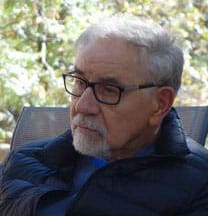Sporting a blond wig and slinky dress, Beit T’Shuvah’s whippet-thin Cantor Rachel Goldman Neubauer sat on Harriet Rossetto’s knee and parodied Marilyn Monroe’s famous, breathy “Happy Birthday” crooning to JFK.
Then the 250 or so people at Beit T’Shuvah — all of them fans of the Jewish rehab clinic/halfway house/synagogue in Culver City and Rossetto, its founder and CEO — joined in the singing.
The Dec. 29 celebration was not only for Rossetto’s 75th birthday; it also marked the debut of her first book, “Sacred Housekeeping: A Spiritual Memoir,” an enlightening and funny look back at her life before and during her time at Beit T’Shuvah.
When people come to Beit T’Shuvah, they’re usually in need of being saved from their own addictive behavior. At any one time, there are about 150 men and women of all ages in residence, nearly all of them Jewish, often with a criminal record. Some are repeat offenders remanded there by the courts as a last-ditch attempt to detour a dead-end life. Some are professionals whose lives, fueled by substance abuse, have spiraled out of control. Some are lost children, “nice” Jewish kids gone astray.
As part of the festivities, Rossetto received many grateful, emotional tributes. People stood and thanked her, referring to her as a “saver of souls,” something she’s made her life’s work.
One of the tributes to Rossetto was from a middle-aged man who talked about how Beit T’Shuvah had saved him. Then he echoed the gift-giver’s clichéd lament: “What do you give to the woman who has given you everything?”
Perhaps a young woman’s comment to Rossetto summed things up best: “[You created] this amazing organization because you believe in throwaway people. I came here when few people believed in me.”
At one point during the celebration, Rabbi Mark Borovitz, Rossetto’s husband and partner at Beit T’Shuvah, waved toward the crowd.
“Look what you’ve done, Harriet. You brought out all these people. They’re here because you touched their lives. Everyone here lives a better life for having met you. You’re not just a soul saver, you’re a soul enricher.”
Rossetto, wearing a glittery blouse with the text “Here’s Looking At You, Kid” in sequins, took the accolades in stride. She described Beit T’Shuvah’s long, strange trip: How she met Borovitz when he was in jail; how, after getting out, Borovitz came to Beit T’Shuvah in its early years, looking for a way to get his life on track; how he and Rossetto joined forces and became a couple at work and in life.
There were less-serious moments, too. She read aloud from “Sacred Housekeeping,” a chapter called “Rogue Rabbi & Rebel Rebbetzin,” mentioning that Borovitz, as far as she knows, is the only one who went from being a criminal to being a rabbi. She paused and added, “Usually it’s the other way around,” drawing a loud laugh.
Rossetto also talked about how Borovitz’s decision to study for the rabbinate — at the University of Judaism’s (now American Jewish University) Ziegler School of Rabbinic Studies — put strains on her cravings to go to Costco on Saturday or have coffee before Shabbat services.
In her book, Rossetto wrote about what led her to start Beit T’Shuvah: “Something drove me to live outside the lines, always eager to stretch rules and limitations. I hated bureaucracy. And rebellion? It was the quality I most admired in myself and others. For me, every rule had an exception, which I believed kindled the spirit of Beit T’Shuvah and was a crucial agent in the healing of exceptional people.”
After the celebration, Rossetto talked with the Journal about her own personal conflict, which she also wrote about in “Sacred Housekeeping.”
“All my life, I’ve wanted to do good in the world,” Rossetto said. “That part of me has always fought with the part of me that wants to stay in bed and do nothing.”
Rossetto emphasized that her empathy for addicts and alcoholics comes from seeing those conflicting tendencies in herself. To drive the point home, Rossetto told a story.
There was once a rabbi, she said, who ministered among thieves, drunkards and prostitutes. His talmudic disciples asked him how such a holy man could so easily understand the problems of “those kinds of people.”
The rabbi, Rossetto said, answered this way: “When I listen to them and look into their eyes, I discover that their weaknesses are reflections of my own. It is not that I have done what they have done; but I sense within me their lusts, their desires, their weaknesses, their temptations.
“If I listen to someone confessing his transgressions, whatever he’s done, whoever he is, and I don’t see myself, then I know I haven’t looked deeply enough. I know I must be hiding something within myself of which I’m not fully conscious.”
Rossetto said that for the last quarter century, while running Beit T’Shuvah, she’s looked deep into herself and seen the darkness that addicts and alcoholics have inside them. It’s that recognition of the darkness within herself, she said, that has given her the tools and the ability to help desperate people become whole.























 More news and opinions than at a Shabbat dinner, right in your inbox.
More news and opinions than at a Shabbat dinner, right in your inbox.